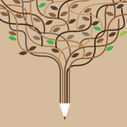David Price: In my book, OPEN: How We’ll Work, Live And Learn In The Future, I argue that a relentless focus upon high-stakes accountability — through student testing and teacher evaluation — has done little to improve outcomes, and has de-professionalized and demoralized teachers.
.
On the other hand, the flourishing of social collaboration among educators offers hope for a profession under siege, because it’s through self-determining their own professional learning that teachers and administrators can both offset the worst effects of being told how to do their jobs and accelerate innovation.
.
After the failure of command-and-control, there is now a growing interest in self-managed work-groups, radical transparency and open learning systems as productivity and innovation drivers. What would that look like for educators?
.
“Open” as a way of working, and living our lives, is winning. It is time we applied it to education.
.
Learn more:
.
- https://gustmees.wordpress.com/2015/03/04/learning-to-learn-preparation-for-better-learning-how-to/
.
- https://gustmees.wordpress.com/2014/07/10/education-collaboration-and-coaching-the-future/
.
.



 Your new post is loading...
Your new post is loading...











OPEN: education that fosters innovation and creativity, that validates that individuals learn in different ways and paces. The foundstion of this vision is one that is not filled with fear of failure. Fear on the part of teachers that they will fail to measure up to high scores for student achievement on standardized tests or,an evaluation system that checks off boxes band on 45 mi Utes in a classroom by a sometimes inexperienced administrator. Freedom from fear for students who work in a system of grades for every piece of paper, where the focus is on work completed rather than learning.m. If we are to achieve this better vision of education in the future, then we must be willing to make some fundamental changes to our business as usual school system in America.
This article talks about the future and how an open education will bring about more diversity, something I am passionate about.